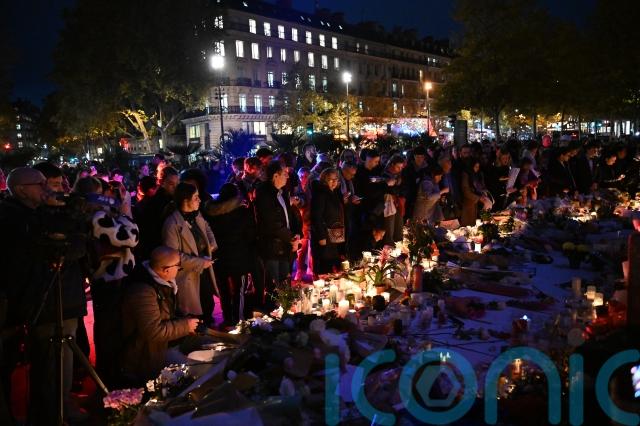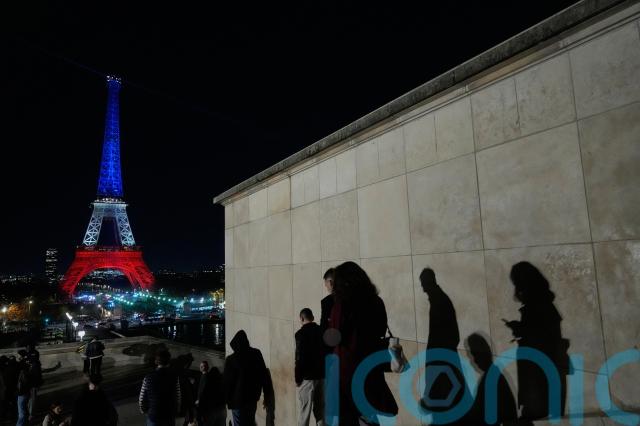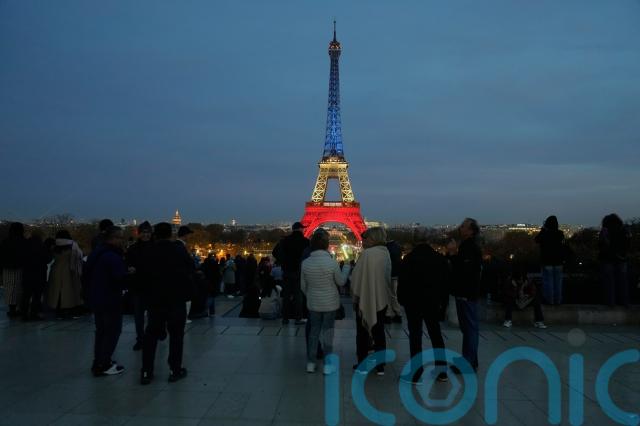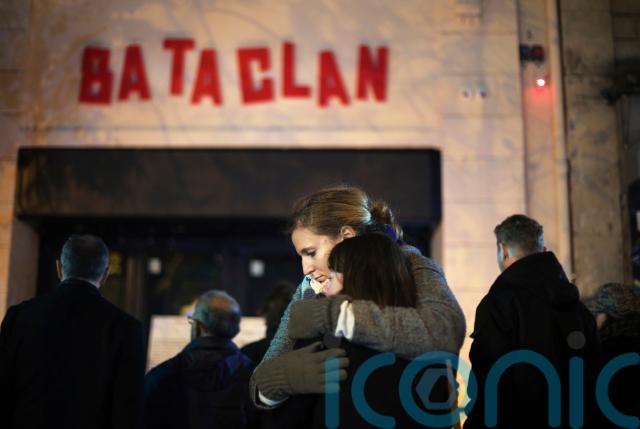
Tributes have been paid to victims of the terror attacks in Paris as France commemorated the night a decade ago that scarred and reshaped the country.
Gunmen and suicide bombers from the so-called Islamic State group killed 132 people and injured hundreds more in the French capital.
With minutes of silence and readings of the victims’ names, the French capital mourned the dead and innocence it lost on November 13 2015 but also proudly recalled how Parisians came together, looked after each other and slowly but surely rebounded.
“Ten years. The pain remains,” French President Emmanuel Macron posted as he led the day of memorials, laying wreaths at attack sites and recalling “the lives cut short, the wounded, the families and the loved ones”.

The daughter of the first person killed fought tears and described her “void that never closes”.
Sophie Dias’s father, Manuel, was killed when the first bomber detonated outside the Stade de France where France was playing Germany.
Speaking at the stadium gate where he was killed, she said his absence “weighs every morning and every evening, for 10 years”.
She said: “My father loved life. He believed in freedom, in the simple joy of being together, of sharing precious moments with his family, and he instilled in us the values of the Republic.
“That’s what hatred sought to destroy. But that’s precisely what we carry with us today. Stronger than anything, despite the pain, despite the absence and this gaping hole. We remain standing.”

Three bombers sought but failed to get inside the stadium. Security agent Salim Toorabally turned away one of them and, after they detonated their explosive vests outside, tended a wounded man.
“He had like these bolts (pieces of metal) lodged in his thigh,” Mr Toorabally said in an interview with The Associated Press. ”There was blood. I didn’t have gloves on, and there were pieces of flesh in my hands.”
Mr Macron and first lady Brigitte Macron — joined by Paris Mayor Anne Hidalgo — toured all the attack sites, talking to survivors and relatives of those killed, laying wreaths and standing in silence for the dead and hundreds more injured.
So numerous were the victims of the massacre at the Bataclan concert hall that it took four full minutes to read out all their names.

The 92 victims there include two men who survived the three-hour siege but who later died by suicide. Another 39 people were killed that night by gunmen who sprayed cafes and restaurants with bullets.
“You never fully heal. You just learn to live differently,” said Arthur Dénouveaux, who escaped the Bataclan and leads the victims’ association Life for Paris.
At Place de la Republique, Parisians gathered with candles, flowers and handwritten notes at the base of Marianne, the national symbol, as they did in 2015.
The bells of Notre Dame Cathedral and other Paris churches rang out on Thursday evening.
The commemorations culminated with the inauguration of the “November 13 Memory Garden” opposite City Hall.
Conceived with victims’ associations, the park’s granite blocks rise to evoke the attack sites.
Jarvis Cocker, frontman of the band Pulp who has lived in Paris, spoke at the evening ceremony of being rattled by the attacks but in love with Parisians.
“The Republic isn’t dead. One for all. Vive la France,” the Britpop star said in French.
City and health workers, emergency service personnel and others read out the names of all 132 dead at the evening ceremony, taking them more than nine minutes.
The Eiffel Tower was lit in the colours of the French flag after nightfall. The French football federation is observing a minute of silence and other tributes at France’s World Cup qualifier against Ukraine at the Parc des Princes.
On November 13 2015 – a Friday – nine gunmen and suicide bombers from the so-called Islamic State struck within minutes of one another.

Suicide bombers detonated outside the Stade de France; gunmen sprayed bullets across café terraces; and three attackers stormed the Bataclan at 9.47pm local time (8.47pm GMT), killing 90 people before police ended the siege. Two survivors who later took their own lives have since been recognised among the victims.
For survivors, the date reopens wounds.
“The 10th anniversary is here and emotions and tension are everywhere for us survivors,” said Arthur Denouveaux, who escaped the Bataclan and leads the Life For Paris association. “You never fully heal. You just learn to live differently.”
Many describe a second task after grief: rebuilding the ordinary – work, friendship, even noise – without flinching.
A 2021–2022 trial ended with life imprisonment without parole for Salah Abdeslam, the lone surviving assailant, and convictions for 19 others.
For many, accountability did not erase the strain of trauma or the daily work of recovery; it clarified what must be protected.
As names are read and wreaths laid, the message from officials and families is consistent: remember the victims, honour the responders, and preserve the ordinary pleasures the attackers meant to destroy.
The goal, planners say, is simple: grief without spectacle, memory with room for the living.
Subscribe or register today to discover more from DonegalLive.ie
Buy the e-paper of the Donegal Democrat, Donegal People's Press, Donegal Post and Inish Times here for instant access to Donegal's premier news titles.
Keep up with the latest news from Donegal with our daily newsletter featuring the most important stories of the day delivered to your inbox every evening at 5pm.